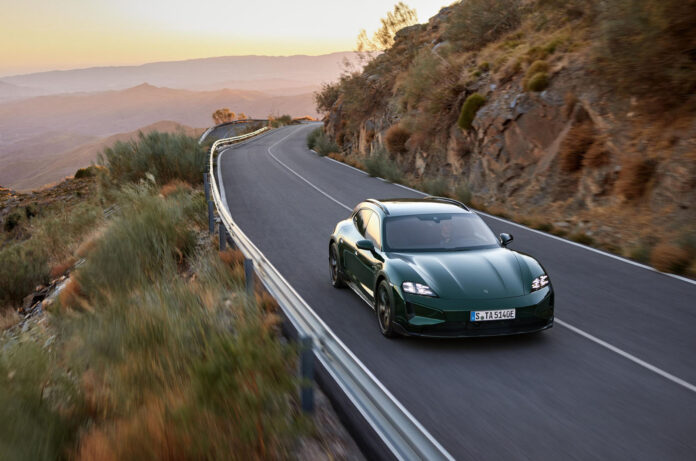Chastened car maker retreats back into combustion engines after its US and China EV plans hit trouble
“We believe Porsche is at the sweet spot of the luxury car BEV transition.” So said Lutz Meschke, then chief financial officer of Porsche, at the company’s bullish capital markets day in 2022.
Back then, optimism abounded among executives that the storied Volkswagen Group brand could springboard from its successful launch of the Taycan saloon into an electric, high-tech expansion that would allow margin-swelling price increases and send its soon-to-be-listed stock soaring.
Roll forward just three years and the brand’s electric dream is now in tatters.
Porsche’s goal for EVs to account for more than 80% of its sales is long dead; future electric models have been axed; and Meschke is old news after leaving, along with many of the other board members who confidently delivered the 2022 plan to investors and analysts assembled at the company’s impressive R&D centre in Weissach, Germany.
Meanwhile, Oliver Blume’s dual role as CEO of both Porsche and the wider Volkswagen Group is under scrutiny like never before.
Porsche has been rolling back its 2022 promises for a while now, including the decision to return to combustion engines for a Macan replacement due in 2028 and extending the life of the Cayenne and Panamera into the 2030s.
But on 19 September, the brand announced its biggest bonfire of the 2022 plans yet: it will delay the development of its planned high-tech electric platform until “well into the 2030s”. The SSP Sport, a luxury performance version of the wider Volkswagen Group electric Scalable Systems Platform, was to give Porsche the technological leadership it needed to see off rivals, especially in China, and command the higher prices it wanted.
The platform was scheduled to underpin the ‘K1’ large electric SUV as well as replacements for the Taycan and Panamera.
Now those plans are in the bin and Porsche has dropped the SSP Sport for the time being to focus on the launch the K1 as a combustion-engined model arriving in the early 2030s.
No new electric car is now planned after next year’s Cayenne EV and the 718 Boxster/Cayman EV sports car duo, which themselves will have a combustion-engined version for ‘top’ models in another reversal.
“We have seen a clear drop in demand for exclusive battery-electric cars,” Blume said on the 19 September call to investors.
The future for electric cars looks grim in Porsche’s two biggest markets, China and the US. China was the biggest market for Porsche back in 2022 and naturally the company thought it would be ripe for new electric models, given the direction of travel there.
But then in 2024, sales of luxury models started falling alarmingly amid a property price crash and local digital-led brands such as Xiaomi increasingly offered cut-price Porsche glamour linked to technology the German brand lacked. After nearly reaching 100,000 sales in China in 2021, Porsche is forecasting sales of just 40,000 there this year.
Meanwhile, the US under president Donald Trump has ripped up all legislation that was steering car companies to go electric after deciding that rising global CO2 levels isn’t a big deal.
Europe is still a substantial and growing market for EVs and so far this year the electric Macan has outsold the combustion-engined Cayenne in the region. But the bigger K1 was intended for the US and China, sealing the fate of the electric model.
The retreat back into the comfort of its traditional combustion engine stronghold “will require substantial investment”, Blume said. The €1.8 billion (£1.6bn) cost of binning development of the SSP Sport comes on top of a €1.3bn (£1.1bn) write-off in the first half of the year, much of it related to the failure of Porsche-owned Cellforce, a battery firm. The company forecasts just 2% net profit margins this year after posting some of the best numbers in the industry at 18% in 2023.
Analysts were left wondering what the value of Porsche should be after a series of write-downs. “These are not margins that one would expect to see in luxury products,” Patrick Hummel, lead automotive analyst for banking firm UBS, said on the call. Hummel noted that Porsche shares still trade at 18 times company earnings, despite a 41% drop from their height in 2023, compared with around six or seven times for BMW and Mercedes-Benz. “Investors might increasingly look at P911 [Porsche’s stock ticker] as a cyclical premium car company rather than a highly profitable luxury goods company,” he said in a note to investors.
Porsche’s confidence that it could pivot to luxury EVs was ambitious but not recklessly so in the context of the Tesla-hyped bubble of 2022. Porsche executives back then, for example, quoted forecasts by influential consultancy McKinsey saying around half of the luxury automotive market was going to be electric by 2031.
Other luxury brands have also retreated from EV plans – for example, Maserati’s €1.5bn (£1.3bn) write-down earlier this year.
The long delay to the SSP Sport platform will inevitably have a knock-on effect on Volkswagen Group stablemate Audi, which was helping with the development of a platform that would have delivered level-three eyes-off autonomy, among other advances. It will also hurt Rimac, which supplies electric drivetrain parts to its investor. Any payment negotiation between the two could potentially end up with Rimac CEO Mate Rimac taking full control of Bugatti, which is currently 45% owned by Porsche.
Porsche insists that it’s still committed to EVs. However, the company’s high-profile retreat in the same month that BYD broke the production speed record in its electric Yangwang U9 Xtreme hypercar and the Chinese press reported that Lotus is aiming for a sub-6min Nürburgring lap time in its electric Eviya is bad news for Europe’s hopes of electric tech leadership in the luxury space.
